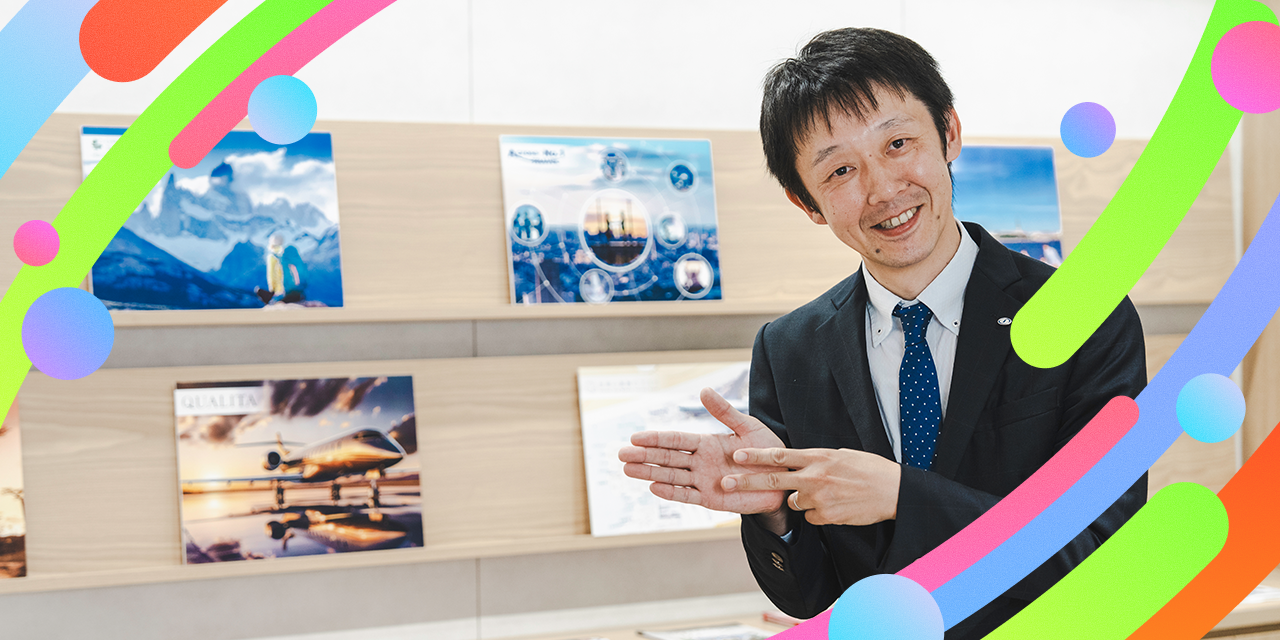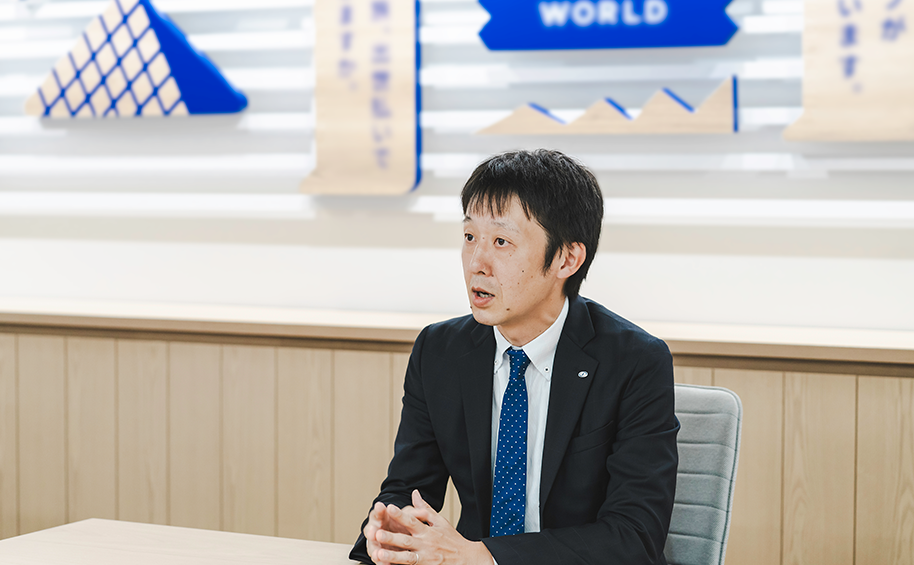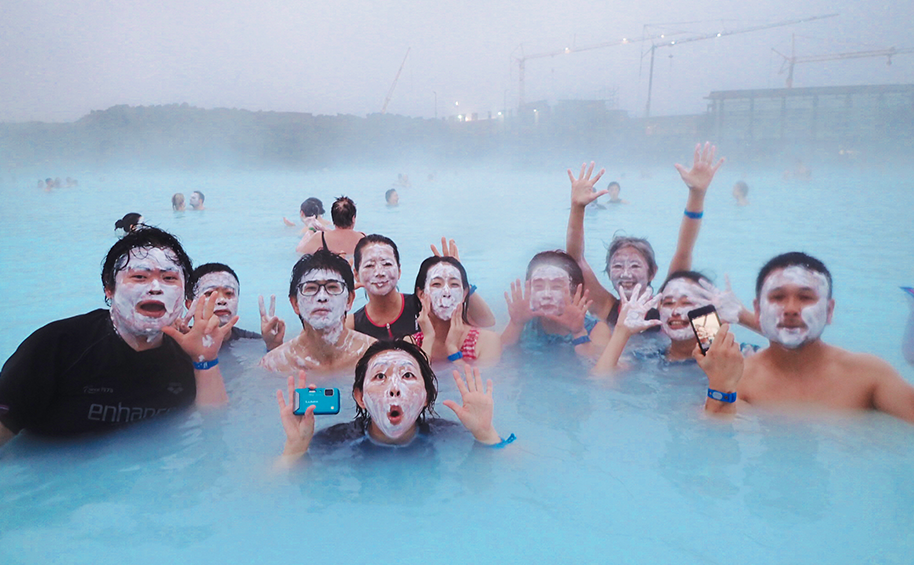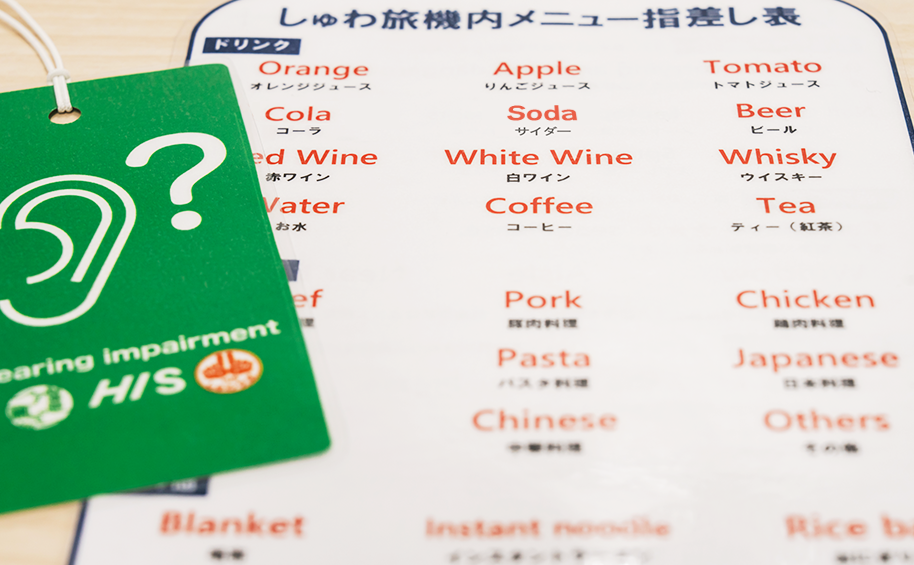
Possible Journeys Expanding from a world Without Sound: The Vision behind "Shuwa-Tabi" Universal Tourism Desk [Part 2]
In the second part of our feature on the Universal Tourism Desk, we focus on "Shuwa Tabi," a travel product launched in 2010 that provides sign language support for people with hearing impairments. We spoke with Koichi Katagiri of the Universal Tourism Desk, who was born with sensorineural hearing loss. Drawing from his own experiences, he has created travel products that help people with hearing impairments to enjoy their trips, and he personally guides these tours.
Please tell us about your career background, including how you came to join the company and your journey to being assigned to the Universal Tourism Desk.
I started learning sign language after entering university. Both of my parents have hearing impairments, but since my grandmother could hear and I attended regular schools for elementary and junior high, I never really had the chance to learn sign language. After enrolling in a social welfare university in Aichi, and finally learning sign language, I began using it in conversations with friends. Back then, it was still unusual for many of my friends to travel abroad. When I told them about my trip to Korea--where I only bought a plane ticket, found hotels as I went, and came back by ferry to Shimonoseki--they showed a lot of interest. They'd ask, "How did you manage to do that?" and say things like, "Maybe I should try traveling, too." This experience sparked in me the desire to share my travel experiences with others in similar situations, and my dream of working for a travel company became clear.
I decided to join HIS because I felt a connection to the company after purchasing my plane ticket at an HIS branch in Nagoya, and I was drawn to the company's culture of empowering anyone to have success, regardless of disabilities.
After joining HIS, I gained about two years of experience primarily supporting group and corporate travel. Around my third year, I learned that the Barrier-Free Desk (now the Universal Tourism Desk), specializing in travel arrangements for the elderly and people with physical disabilities, had been built. At the time, internal transfers required at least three years of experience in the current department. So, as soon as I met the requirement, I didn't hesitate to raise my hand and was happily transferred to the Barrier-Free Desk.
Please Tell us the story behind the launch of "Shuwa Tabi".
The primary motivations behind my work are the realization that my personal international travel experiences could be helpful to others, and the desire to create an environment where people with disabilities could enjoy travel more. At the time, overseas travel often lacked adequate support for people with disabilities, and it wasn't uncommon for them to be denied when trying to book a trip. I strongly wished to change this situation.

After moving to the Barrier-Free Travel Desk, around 2007, I started planning and guiding group tours that would allow customers with hearing impairments to enjoy their travels through communication in sign language. This was the precursor to 'Shuwa Tabi. Subsequently, by involving individual travelers, 'Shuwa Tabi Nakama' was born in 2010 with the theme of "creating travel companions who use sign language." The concept behind "Shuwa Tabi Nakama" is "Expanding our world and our circle of friends through Sign language." It focuses on participants enjoying travel with sign language as a common language, and sharing new encounters and emotional experiences with new friends. As a tour guide for "Shuwa Tabi Nakama," I accompany the group and make sure to prioritize interaction among all the participants. We also offer another tour called "Shuwa Sapo", where a separate tour guide is arranged, and a travel sign language interpreter dedicated to information transmission accompanies the group. In both cases, the maximum number of participants is 10. In the past, we operated tours with 20 participants, but when the group was large, it was challenging for customers at the back to see sign language clearly, making information difficult to convey. Therefore, to ensure all customers can enjoy their trip comfortably, we set a limit of 10 participants, allowing for detailed support and smooth information transmission. The courses are tailor-made, assembled each time after hearing the customers' requests. Therefore, it becomes a "once-in-a-lifetime" experience, where the same course never repeats. Previously, we conducted up to 10 overseas tours annually, but currently, after the pandemic, we are operating at a pace of one tour every two to three months.
What do you keep in mind when planning and guiding "Shuwa Tabi" tours?
What I value most is truly enjoying the trip myself. Because our customers cannot hear, they rely solely on visual information and observe people's facial expressions very carefully. So if I were to look bored or tired, customers would immediately sense that, and that's why I always try to smile and express the joy of the trip with my whole body.
For example, when we visited the famous Blue Lagoon in Iceland, customers were hesitant about who would go in first. So, I took the initiative to get into the hot spring and put mud on my face, "setting an example." Also, when a male customer in his 70s said he wanted to try bungee jumping in New Zealand, the birthplace of bungee jumping, I was the first one to jump after we arrived at the site. After seeing my jump, the other customers took turns challenging themselves to bungee jump as well, and the man in his 70s followed suit.

Our visit to Iceland's Blue Lagoon on "Shuwa Tabi Nakama"
As I lead by example and enjoy every step of my job, my family and colleagues who see me in action often say, half-exasperated, 'Are you really working?' However, I think that's perfectly fine. To give customers the best travel experience, I must wholeheartedly enjoy the trip myself; otherwise, I cannot deliver the most emotional experiences to them.
Could you share a particularly memorable "KOKORO ODORU" episode?
Customers who initially didn't even know how to get a passport, gradually gained travel knowledge and confidence by traveling to various places and accumulating diverse experiences through "Shuwa Tabi Nakama." This growth has led them to a point where they can now participate on their own in HIS's guided 'impresso' tours. While it's a little sad to see customers "leave the nest" from me, seeing their growth up close through "Shuwa Tabi Nakama" was truly heartwarming. To this day, I still manage all the arrangements for these customers, and when they apply for an "Impresso" course, we have them fill out a "health questionnaire" to ensure that those with health concerns or physical disabilities can enjoy their trip with peace of mind. Furthermore, by thoroughly sharing information between departments, we try to create an environment where they can participate with full confidence.Thanks to such support, the customer has become a regular "impresso" repeater and is now a veteran traveler exploring various parts of the world alone.
Witnessing customers grow significantly through "Shuwa Tabi" is the greatest joy for me and the true essence of this job.
How do you envision the future of "universal tourism"?
My understanding of universal tourism is not merely about removing physical barriers. I view it as acknowledging the existence of barriers and working to resolve them. As the travel industry increasingly moves online and becomes paperless, I believe the ideal form of universal tourism is to support customers who might be left behind due to lack of information.
Currently, international tourists, especially the elderly and those with hearing impairments from South Korea, the UK, and the US, point out lack of progress in Japan's barrier-free accommodations. For example, Japan's symbol for hearing impairment is not easily understood overseas, so "Shuwa Tabi" has created a more universally recognizable, handmade design that we distribute to our customers. We also create and provide our customers with a "pointing menu chart" to ensure smooth in-flight meal orders.

"Shuwa Tabi's" original hearing impairment symbol and in-flight pointing menu
Furthermore, in Indonesia, there is a village called Bengkala, known as the "village of the deaf." Many residents in this village are deaf, and sign language is the primary form of communication. "Shuwa Tabi" has planned a tour to visit Bengkala village and its school for the deaf, providing an opportunity for participants to interact with villagers and school children to gain a deep understanding of sign language culture. Since Bengkala village has its own unique culture of sign language, it creates a chance for both hearing and deaf individuals to communicate through gestures, offering an opportunity for visitors to experience a unique deaf culture abroad.
Considering the challenges of the lack of an international icon for the deaf and hard of hearing, as well as the low recognition of the Japanese symbol, we aim to continue proposing the possibilities of universal tourism through "Shuwa Tabi" by offering opportunities to learn about, understand, and interact with the deaf community.
-

-
Koichi Katagiri
H.I.S. Co., Ltd.
Assistant Manager, Universal Tourism DeskJoined in 2002. After working in group and corporate travel, was transferred to the Barrier-Free Desk (now Universal Tourism Desk) in 2005. Responsible for creating sign language-supported guide tours like "Shuwa Tabi Nakama" and conducting sign language-focused product developments and workshops.
*The content of this article is as of the time of the interview.
